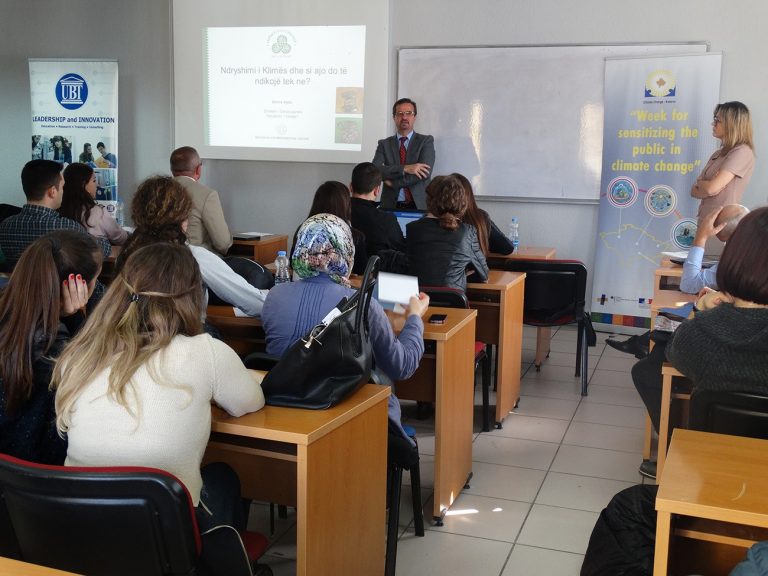
Kosovo Lacks Information on Climate Changes
21/10/2015As part of the week on the public awareness of the climate changes, a lecture on the topic “Climate Changes” was held at the UBT today. The lecture focused on different climate aspects as well as the global initiative on the climate changes, which have been going on for quite some time now.
The lecture was organized in cooperation with the regional Environment Center (REC), office in Kosovo.
Agron Bektashi and Ermira Ajeti from the Regional Environment Center and Halil Berisha, environment manager at “Sharrcem” Company presented in-depth information on this very sensitive topic.
Commenting on the climate changes, Agron Bektashi noted that no one can say today that the climate changes do not concern everyone because that was not the case at all. He explained that the international organization “Week” which was established in 1990 by the United States and the European Union and is based in Budapest, deals with the climate problems but also with other related issues, such as economic and social problems.
“It has also been working successfully in Kosovo for several years now. We are partners of many universities, the civil society, and all those who wish Kosovo good. This is a modest contribution of the ‘Week’ in the forerun to a big world conference that will be held in Paris,” Bektashi said among others, while opening a debate facilitated by the German and French embassies in Kosovo.
Emira Ajeti said this was the fourth in the series of lectures held in different universities whose goal was sharing of information and having debates on the climate changes and the consequences it may have to the economy of a country in this case in Kosovo. She invited students to voluntarily become part of the workshops and a five-day training at which there will be practical work and presentations that will show the reality of the climate changes and what can be done about it.
“Kosovo’s main priority is sustainable economic development. It is not enough to only have economic development but there has to be sustainability which is a problem of all of the Balkans. Unfortunately, 30.2 per cent of the population is unemployed in Kosovo and based on the surveys, it turns out that over 60 per cent of the countries in the world have global initiatives on climate changes. Therefore, we can conclude together that in this respect Kosovo lacks public awareness on climate changes which affect the people,” she said.
Emira Ajeti also noted that two of Kosovo’s most important economic sectors were agriculture and forestry, but a country like Kosovo is not capable of dealing with the phenomena of heavy rainfalls. She also noted that, regrettably, Kosovo just like all the rest of the Balkans, was a country with many deniers of the climate changes and even there are some who have doubts about the scientific consensus on the changes. “These myths are usually addressed by the young people; therefore, one of the main goals of the projects is to engage young people because they are more open-minded and prepared for changes,” she said.
Halil Berisha, an environment manager from the Sharrcem cement company, an industry which has an impact on the climate changes, said the factory had been operational since 1936 and after it has been privatized by international company of cement called Titan, it started changes in respect of focusing on the effects on the environment.
According to Berisha, in this respect, the Sharrcem Company has been certified according to the highest and most advanced international standards, like ISO 14000 on environment achievements and standardization. He said all polluting parameters that can be caused by the cement industry are well controlled and could be monitored thanks to the investments that were made in the factory, while all substances that are considered damaging for the environment are constantly monitored.